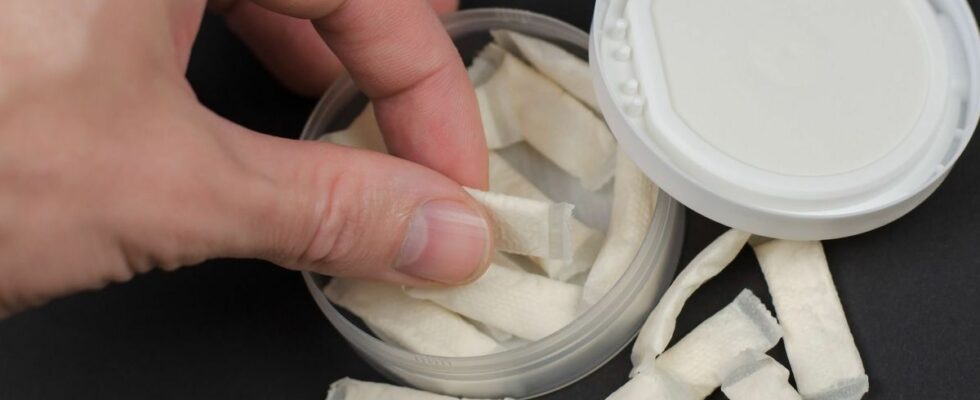Published on
updated on
Reading 4 min.
The verdict is in: “pouches”, these flavored tobacco-free nicotine sachets, will soon be banned in France. This strong announcement was made on Tuesday by the Minister of Health Geneviève Darrieussecq, a few days before the start of “tobacco-free month” in November.
The Minister of Health is concerned about the explosion in the consumption of these products, particularly among young people. These small chewable sachets, often perceived as less dangerous, nevertheless attract more and more consumers, making this measure urgent for public health.
Why the ban? A product that targets young people
Pouches, small doses of tobacco-free nicotine to slip under the lip, arrived in France riding the wave of alternatives to traditional tobacco.
According to Geneviève Darrieussecq, their dazzling success among young people is worrying: “The marketing of these products is directly targeted towards young people and I hope that we can protect our youth”, she adds, specifying that a “text ban will be published in the coming weeks.
According to health authorities, too many young people who have tried these products think they are safe, a myth widely contradicted by health experts. Although these sachets do not contain tobacco, the dose of nicotine is powerful, putting users at risk of rapid addiction.
Alarming figures: an insidious addiction
These nicotine sachets have only recently appeared, but the figures already show a worrying trend. In France, the use of pouches has exploded, and their distribution still escapes strict regulation. Today, one in three young people aged 13 to 15 have already tried a nicotine product, according to a recent study by the Ministry of Health.
Faced with this observation, the minister considers this ban necessary: ”I am very concerned because poison control centers are receiving more and more calls from adolescents for acute nicotine syndromes, sometimes severe, linked to the consumption of the pouches. They result in vomiting, convulsions, hypotension and even disturbances of consciousness.“, describes the minister.
“These are dangerous products because they contain high doses of nicotine. It is our duty to prohibit its marketing“, she concludes.
The message is clear: it is time to put an end to the proliferation of this type of product.
What health risks? Nicotine, a minimized danger
Although nicotine sachets seem harmless, the associated risks are very real. The nicotine contained in the pouches is absorbed through the oral mucous membranes, quickly reaching the central nervous system and creating an addictive effect. Some sachets contain up to 20 mg of nicotine, a high dose which promotes rapid addiction, especially among young people who are still vulnerable to psychoactive substances.
For his part, the National Food Safety Agency (Anses) took stock, at the end of 2023, of the risks induced by such consumption for young people. If she does not detail them according to the type of product, she explains: “Nicotine sachets, tobacco sachets (Snus), aromatic beads for cigarettes… Poison Control Centers are receiving more and more calls from people poisoned due to of these products. And to specify: “The majority of people poisoned following the consumption of nicotine sachets or snus were aged between 12 and 17 years old. (…) These adolescents presented acute nicotine syndromes, sometimes severe: prolonged vomiting with risk of dehydration, convulsions, disturbances of consciousness, hypotension requiring vascular filling“.
Towards the end of the Puffs before the end of the year
To prevent the spread of this emerging addiction, a ban on nicotine sachets is expected to be implemented in the coming weeks. The Minister of Health announced that the terms of the ban will be specified by decree, with the aim of providing a clear and dissuasive legislative framework.
Géneviève Darrieussecq also specifies that the transpartisan bill adopted in Parliament at the start of the year to ban “puffs”, these single-use electronic cigarettes also popular with young people, should be promulgated “in the coming weeks”.
“My goal is to stop marketing them before the end of the year.“, she said.
The minister also insisted on the need to strengthen prevention among young people and parents to make them aware of the dangers of nicotine in all its forms. Anti-smoking awareness campaigns will thus be expanded to include these new products.
Reactions from the sector and prevention associations
The announcement of this ban sparked various reactions. Smoking prevention associations, such as the Alliance Against Tobacco, welcome a measure which finally goes “to the root of the problem” by banning a product explicitly attractive to young people. On the other hand, some industry players believe that this ban risks promoting a black market and encouraging young people to turn to other unregulated products.
Last May, the National Committee Against Smoking (CNCT) announced the filing of a complaint for “trafficking in poisonous substances” in the face of the “illegal” sale of these nicotine sachets, calling for their ban.
Pending the implementation of the ban, the debate on alternative nicotine products remains open. If the pouches disappear from the shelves, the question of the fight against nicotine addiction among young people remains unresolved, in a context where product innovations are frequent.
